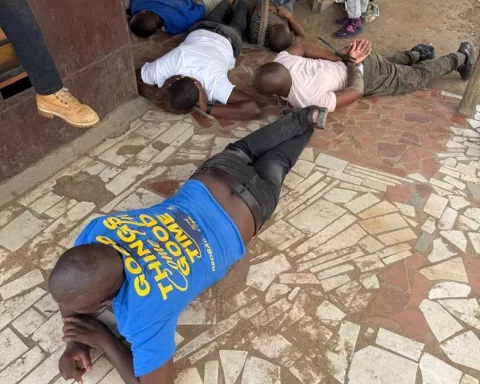Cape Town is grappling with serious challenges in law enforcement, especially with traffic violations. Recently, police arrested 285 people for ignoring traffic laws, showing a troubling pattern where many drivers think they can break the rules without consequences. The city’s leaders, like Alderman JP Smith, worry that some drivers treat safety laws as optional, risking lives on the road. Beyond traffic issues, law enforcement is busy tackling various crimes, highlighting the ongoing struggle between community safety and individual responsibility. As the city works to improve compliance and engage its citizens, the hope is for a safer, more respectful environment for everyone.
What are the current law enforcement challenges in Cape Town?
Cape Town faces significant law enforcement challenges, including high rates of traffic violations, with authorities recently arresting 285 individuals for offenses. Issues like socio-economic disparities and cultural perceptions of authority further complicate these challenges, highlighting the need for community engagement and responsible citizenship.
Cape Town’s vibrant city life often finds itself at the crossroads of law enforcement and civic responsibility. Recent police activities have brought to light the persistent issue of traffic violations, revealing not just individual negligence but deeper societal concerns. These developments underscore a narrative that extends beyond the surface of routine law enforcement encounters.
The Crackdown on Traffic Violations
In a recent wave of enforcement, Cape Town’s authorities arrested 285 individuals, highlighting the persistent issue of traffic law flouting. Among those apprehended were two notorious offenders from Mitchells Plain, whose combined 87 outstanding warrants amounted to R270,100. Just a week earlier, two more individuals faced the law with 43 warrants, valued at R226,550. These alarming figures point to a culture of non-compliance, where legal responsibilities are blatantly ignored, endangering public safety.
Alderman JP Smith, who oversees Safety and Security, expressed concern over these escalating fines and penalties. He emphasized the problem of motorists accumulating nearly half a million rand in fines, underscoring a worrying belief among some drivers that they can indefinitely avoid accountability. One striking case involves an offender currently held at Pollsmoor Prison, unable to post an R18,000 bail, showcasing the real risks of neglecting one’s legal duties.
Despite these concerning trends, Alderman Smith noted a slight improvement in compliance among some drivers over the past year. However, he warned that many still treat traffic laws as optional, posing significant risks to themselves and others on the road. The authorities hope that the recent arrests will serve as a powerful deterrent, encouraging more motorists to adhere to legal requirements.
Broader Law Enforcement Efforts
The city’s efforts to uphold law and order extend beyond traffic violations and cover a wide range of offenses. Over the past week, traffic officers have recorded 46,843 violations, executed 1,366 arrest warrants, and impounded 198 public transport vehicles. Their diligent work resulted in 39 arrests, primarily targeting offenses such as driving under the influence and reckless driving.
In addition, Law Enforcement officers played a crucial role, making 157 arrests and issuing 2,592 notices. The Metro Police further contributed by arresting 89 suspects and issuing 2,224 fines, along with the confiscation of various contraband items. This collaborative, multi-agency approach demonstrates a comprehensive strategy to combat crime at various levels within the city.
One remarkable arrest took place in Hanover Park, where Metro Police captured a 34-year-old suspect found with a 9mm firearm and 14 live rounds. This incident highlights the ongoing struggle law enforcement faces in curbing illegal firearms and related violence within communities, serving as a stark reminder of the challenges that persist in maintaining public safety.
The Wider Context: Historical and Cultural Dynamics
The Public Emergency Communication Centre, an integral part of Cape Town’s safety framework, recorded 1,659 incidents during a single weekend. These ranged from assault and domestic violence to motor vehicle accidents and noise complaints, offering a glimpse into the complex challenges facing the city’s residents on a daily basis.
These ongoing operations evoke historical parallels to the enduring struggle for law and order in urban environments. From the dense streets of Dickensian London to today’s bustling metropolises, the interplay between authority and resistance remains a compelling theme. In Cape Town, these dynamics are further complicated by socio-economic disparities and historical influences, not to mention the impacts of globalization and cultural shifts.
Artistic and literary expressions have long captured these urban tensions, portraying cities as places where opposing forces meet. The Italian Renaissance, with its humanistic focus, explored the potential for both civic virtue and vice in urban settings. Similarly, Romantic literature often depicted cities as landscapes of beauty and chaos, reflecting the dualities inherent in city life.
Towards a Balanced Urban Future
Contemporary Cape Town faces challenges familiar to cities worldwide, balancing the need to enforce laws with respect for personal freedoms. While statistics and enforcement actions offer a current snapshot, they also invite deeper reflection on societal values and behaviors.
As Cape Town navigates these complexities, community engagement and education become vital in fostering accountability. Promoting responsible citizenship must work in tandem with effective law enforcement to address the underlying causes of non-compliance, from economic issues to cultural perceptions of authority. By doing so, the city can strive towards a more harmonious and law-abiding environment.
Cape Town’s recent enforcement operations serve as a microcosm of a broader global story, where urban centers continuously adapt to the demands of modern life. The ongoing narrative of those who defy the law and those who protect it weaves a rich tapestry of human behavior and societal dynamics. By examining these patterns, we gain valuable insights into the city’s evolving identity and the enduring quest for justice and order.
“`markdown
What are the current law enforcement challenges in Cape Town?
Cape Town is facing significant challenges in law enforcement, particularly concerning traffic violations. Recently, police arrested 285 individuals for ignoring traffic laws, which reflects a troubling pattern of non-compliance. Factors such as socio-economic disparities and cultural perceptions of authority further complicate these issues, indicating a pressing need for community engagement and responsible citizenship.
What recent actions have law enforcement taken to address traffic violations?
In a recent crackdown, Cape Town authorities arrested 285 individuals for traffic law violations. This included two known offenders from Mitchells Plain with a combined 87 outstanding warrants. The total fines accumulated by non-compliant motorists have reached nearly half a million rand, prompting concerns from Alderman JP Smith about the perception among some drivers that they can disregard legal responsibilities without consequences.
How do traffic violations relate to broader crime in Cape Town?
Traffic violations are just one aspect of a larger struggle with crime in Cape Town. Over the past week, law enforcement recorded 46,843 traffic violations, executed 1,366 arrest warrants, and made various arrests for other offenses, including driving under the influence and reckless driving. This multi-faceted approach showcases the city’s ongoing efforts to maintain order and public safety across various crime categories.
What role does community engagement play in improving compliance with laws?
Community engagement is essential for fostering accountability and enhancing compliance with laws in Cape Town. As the city grapples with issues like traffic violations and broader crime, promoting responsible citizenship through education and outreach initiatives is crucial. By involving citizens in discussions about safety and legal adherence, the city hopes to create a more respectful and law-abiding environment.
How do historical and cultural dynamics influence law enforcement in Cape Town?
Cape Town’s law enforcement challenges are influenced by historical and cultural dynamics, including socio-economic disparities and the impacts of globalization. The Public Emergency Communication Centre reported 1,659 incidents over a weekend, illustrating the complexities residents face. These factors contribute to the interplay between authority and resistance, reflecting a broader narrative seen in urban settings around the world.
What future strategies are being considered to enhance law enforcement effectiveness?
To enhance law enforcement effectiveness, Cape Town is focusing on a balanced approach that includes strong law enforcement measures coupled with community education and engagement. By addressing the underlying causes of non-compliance, such as economic issues and cultural perceptions, the city aims to foster a more harmonious environment. Continuous adaptation and collaboration among various agencies are vital for addressing the persistent challenges faced by the community.
“`












